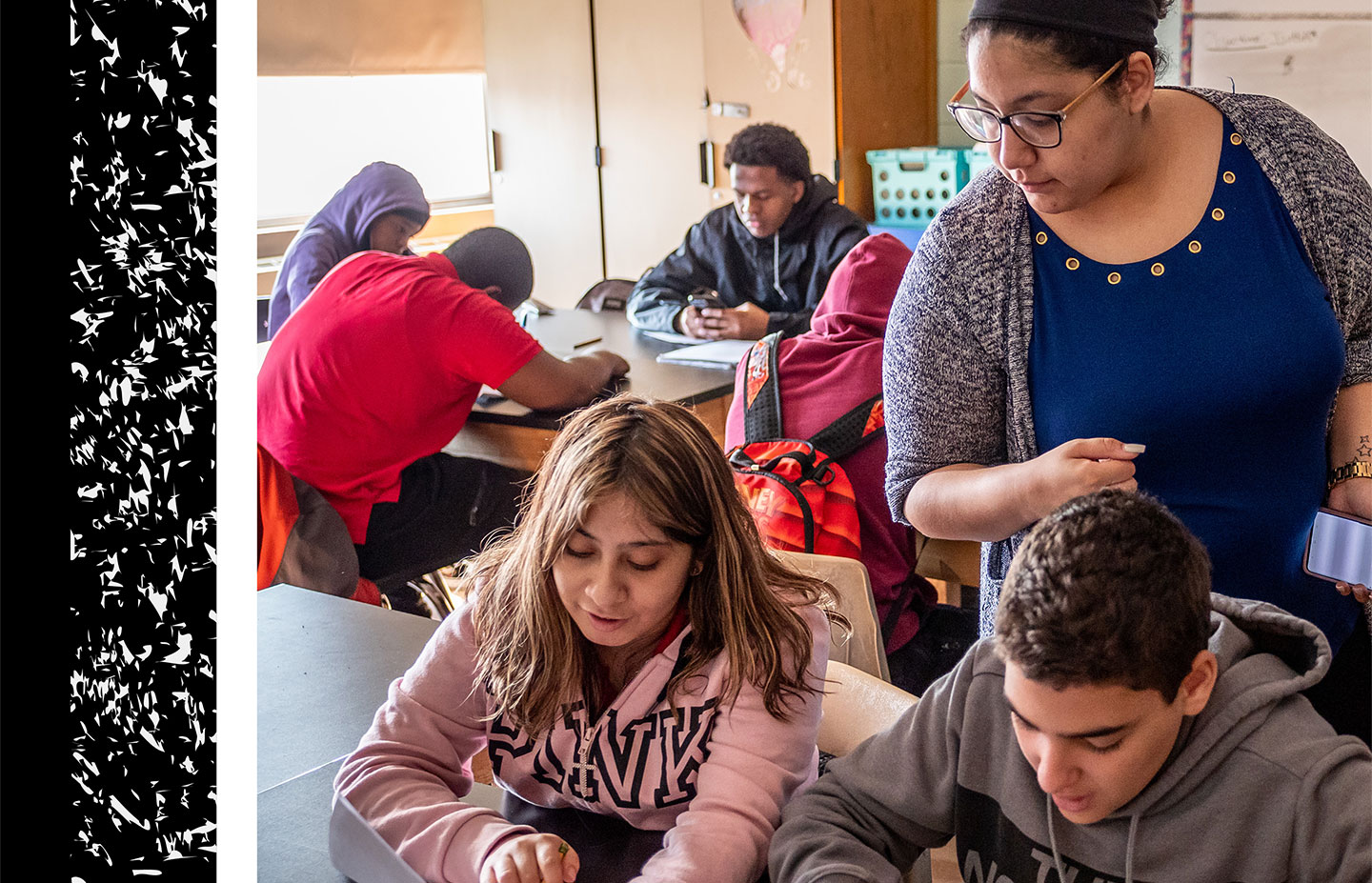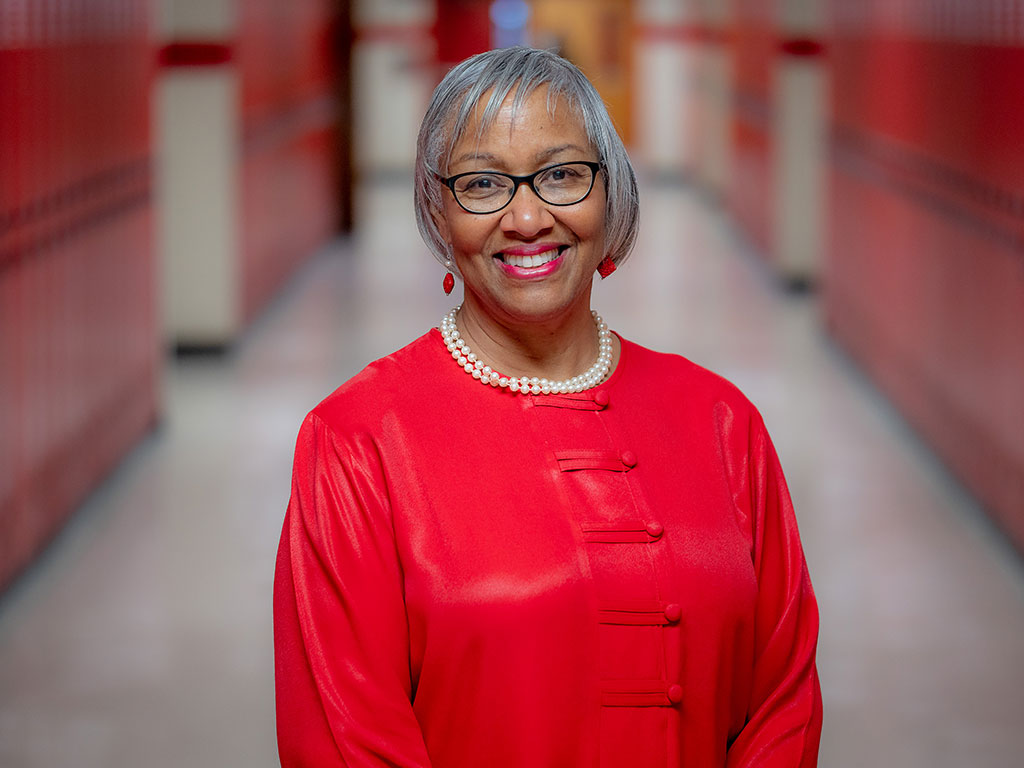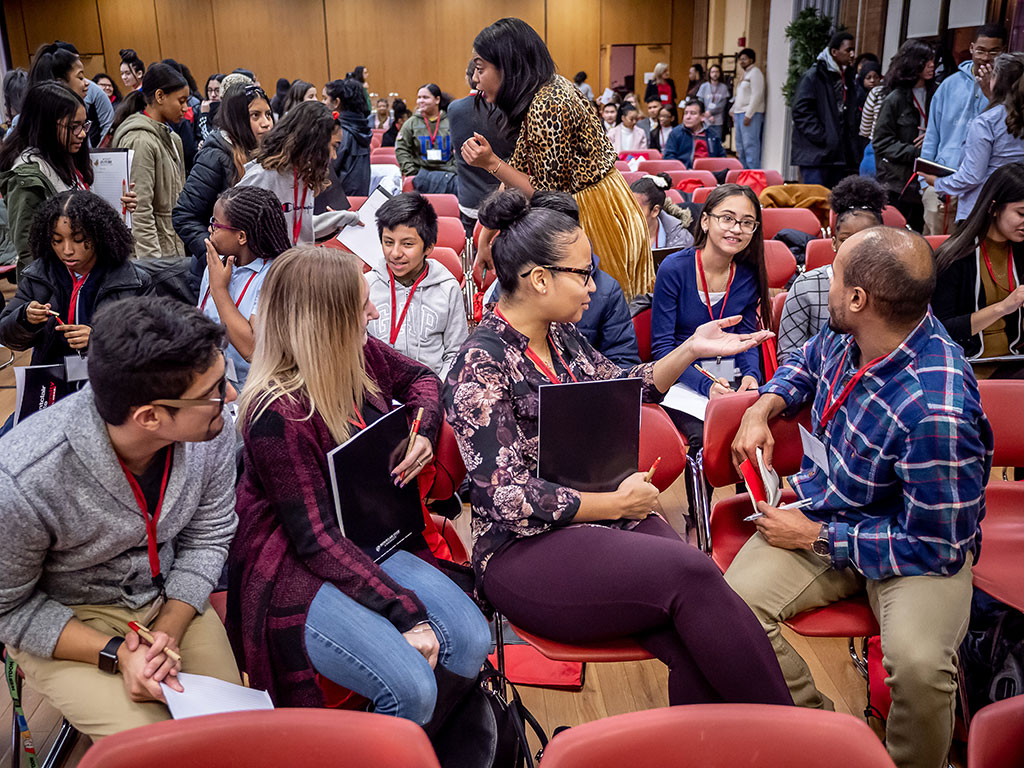
A Teacher Like Me
Education program works to diversify the teacher pipeline, training more teachers of color to return to the schools where they grew up
Deliris Diaz, a first-year teacher at East Side High School in Newark, New Jersey, teaches physics in the same high school where she excelled as a student in science.
As Deliris Diaz moves around the classroom, the first-year physics teacher checks calculations on the gravitational forces in space, encouraging students to trust their instincts. It’s a life lesson, as well as one for the law of physics. At East Side High School in Newark, New Jersey, Diaz has a special understanding of how her students’ world works and what it means when someone inspires you to shoot for the moon.
Diaz was a standout in science and valedictorian at East Side, taught by graduates of the Newark-Montclair Urban Teacher Residency. Today, that same program guides her teaching, with the residency among the grant-funded partnerships Montclair State University has forged to recruit and prepare teachers of color, and provide crucial support in the early years of teaching.
“We want to combat the social inequalities that we are seeing every day in our society,” says Jennifer Robinson, executive director of the Center of Pedagogy. “So, we have a broader mission beyond just teaching students about subject matter. We want to make sure our students see themselves as moral agents who are going to provide their students with access to knowledge, opening doors and windows and opportunities.”
Numerous studies have shown the benefits of a diverse teaching force, including higher academic performance, graduation rates and college enrollment when teachers share race, ethnicity or gender with their students. Yet with a majority of the New Jersey’s public school students being students of color, just 16 percent of the state’s teachers are teachers of color. The New Jersey Department of Education has set a goal of having the ranks of novice teachers – those teaching for four years or less – reflect the diversity of public school students by 2025.

Montclair State takes its role seriously. “We are really becoming more of a magnet for our students of color who are very interested in going into urban education and urban communities,” Robinson says. “In some cases, these are students who’ve grown up in the community. In other cases, these are just students who see some of the inequities in education and want to give back, want to do more for those students.”
Inspired To Lead Change
“Growing up, there weren’t a lot of teachers who looked like me,” Diaz says. “So I would say that was the motivation for me to ask, ‘What can I do to be invited in, to include my voice into this space?’”
Diaz switched careers from STEM research, earning her Master of Arts in Teaching in 2019 as part of the residency program. Diaz is seen as one of the best and brightest, winning a prestigious Knowles Teaching Fellowship, which supports early-career, high school mathematics and science teachers.
Reflecting on her first year during an interview in late February, Diaz says, “Although my students see me as a very young teacher, they often see me as a very relatable teacher, someone who understands and someone who’s always pushing them to be the very best. That’s what I was asking them in today’s lesson – ‘Are we okay? Are we going to do it? Can we do it?’ – just to show them that physics is not so intimidating, that if you just give it a chance, you are more capable than what you let yourself be,” Diaz says.
Raising Expectations
“That becomes icing on the cake, right?” observes Newark Superintendent Roger León, the district’s first Latino schools chief, who himself grew up in the city. “You want to be able to tell a student, ‘I’ve walked these halls, I’ve sat in that classroom.’ It does make a dramatic difference.”
León is in his second year as chief of schools (he earned his Master of Arts in Administration and Supervision from Montclair State in 1996) and has vowed to strengthen Newark schools by tapping the expertise of partner organizations.
“Especially in youth culture today,” he says, “a lot of the students have a belief system that a teacher can’t understand what they are going through. But you may actually have lived in the same projects that they have lived in or have lived on the particular block that’s closest to the school. They may have actually played in the same playground.”
Through research, Robinson says, “we’ve begun to realize that teachers of color are able to have higher expectations of all of their students. They also have a tendency to be able to address issues of racism that sometimes occurs in our schools and in our classrooms. They serve as cultural brokers, individuals who can help all of our teachers and all of our students understand what is going on in terms of an interaction or in terms of a learning style, and are able to build trusting relationships with their students.”

Teacher Academy Launches
Last year, Montclair State was awarded a “Diversifying the Teacher Pipeline” grant from the New Jersey Department of Education. The grant provides funding to develop programs that recruit, prepare, support and place a diverse pool of teaching candidates in New Jersey schools.
At East Side and University high schools, a new Red Hawks Rising Teacher Academy led by Associate Professor Mayida Zaal has introduced its first cohort of ninth graders to social justice education. By the time these first students are in 11th grade, they will be given the opportunity to take college-level courses, sponsored by Newark Board of Education, which will apply toward a degree at Montclair State. The hope is that after receiving their teacher certifications, they will begin teaching careers supported by a collaborative induction plan in Newark Public Schools. Researchers will track their progression.

“What we’re trying to do is open our students’ eyes to understanding the ways in which they learn themselves and the ways in which the students around them learn,” Robinson says. “We want them to see that our society isn’t quite as democratic as we would want it to be, and that they as teachers have the opportunity, if they become teachers, to actually make a difference in the world they will live in, and particularly for the students they will eventually teach.”
The Teacher Academy is being presented in collaboration with Newark Public Schools and the American Federation of Teachers. Students are being exposed to teaching experiences, including reading with kindergarten students, and special events.
In February, a visit by Bettina Love, an author and educational scholar, challenged students to reflect on what it means to teach for social justice. “I want to have a conversation with future teachers and teachers in the classroom right now about teaching black and brown children,” Love said. “I want to argue that you can’t teach us if you don’t know our culture … how dynamic our culture is, how rich our culture is. You can’t teach us if you don’t know us.”

Love appeared as part of the Critical Urban Education Speaker Series, an event that brings leading national scholars to Montclair State. The program was organized by Associate Professor Bree Picower and Assistant Professor Tanya Maloney for Teaching and Learning.
Future Teachers Of Color
As a student of color, Anastacia Ramkishun, a junior at Science Park High School in Newark, has seldom had teachers who share her cultural heritage. Now, as a high school junior with plans to become an English teacher, she’s looking to change that narrative. “I feel I’ll have a better understanding of diverse students, that they’ll be more comfortable and open up to me,” she says.
Ramkishun was among the 300 middle, high school and college students, as well as teachers and guidance counselors, attending a January conference “Inspiring and Motivating a Diverse Teacher Workforce,” hosted by Montclair State. Throughout the day, the students took part in presentations and breakout sessions led by New Jersey’s top educators. Reflecting on their own educational experience, they also shared indelible memories of teachers who inspired them.
“This is really about building community – and building community to make a world that works for everyone,” said keynote speaker Micia Mosely, founding executive director of The National Equity Project. “It is my hope that when you go into teaching, or whatever you do, that you work to build a world that works for everyone.”